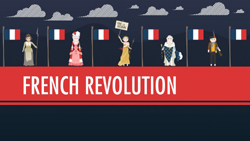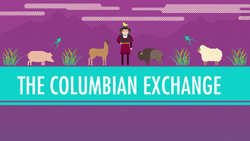-
In the mid-1800s, the Germans and Italians created their
own nations. However, not all national groups were able to reach
their goal.
Although the revolutions of 1848 had failed, the forces of
nationalism and liberalism remained powerful for the rest of the nineteenth
century. Italy and Germany were unified, and Great Britain and France
became more liberal, while Austria and Russia remained authoritarian by
the end of the nineteenth century.
Toward National Unification
-
The rise of nationalism led to the unification of Italy and
Germany.
Breakdown of the Concert of Europe
The Crimean War
The Crimean War resulted from the long-time struggle
between Russia and the Ottoman Empire.
For centuries, the Ottoman Empire had controlled the
Balkans in southeastern Europe-- but by 1800 its authority over the region
had begun to weaken.
Italian Unification
In 1850, Austria continued to rule over the Italian peninsula.
Piedmont
Also known as the Kingdom of Sardinia, a constitutional
and very centralized monarchy in Italy, based on the French model, Piedmont
became the driving engine for Italian unification.
Giuseppe Garibaldi
A dedicated Italian patriot and leader of the Italian
unification movement
German Unification
militarism
Reliance on military strength
Otto von Bismarck
Appointed prime minister of Prussia by King William I,
Bismarck was a practitioner of realpolitik.
realpolitik
the “politics of reality,” politics based on practical
matters rather than on theory or ethics.
Bismarck faced opposition from the legislature to his
miltary reforms, but he ignored it.
The Franco-Prussian War
July, 1870 to September, 1870
The Germans defeated France and captured their ruler,
Napoleon III, as well as an entire French army.
Alsace and Lorraine
As a result of their loss in the Franco-Prussian war,
France was forced to surrender the provinces of Alsace and Lorraine to
the new German state, as well as being forced to pay over a billion dollars
in fines. This left the French burning for revenge.
The Second German Empire*
The southern German states entered the North German Confederation.
On January 18, 1871, Bismarck and 600 German princes,
nobles, and generals filled the Hall of Mirrors in the palace of Versailles,
where William I of Prussia was proclaimed kaiser, or emperor, of the Second
German Empire. With its industrial resources and military might,
it was the strongest power on the European continent.
* The first German Empire, or First Reich, was the medieval
Holy Roman Empire. The German Empire of 1871 was the Second Reich.
kaiser
German for “caesar,” the title of the emperors of the
Second German Empire
REVIEW & DO
NOW
Answer the following questions in your spiral notebooks: |
| . |
. |
|
|
Nationalism and Reform in Europe
-
While Italy and Germany were being unified, other states
in Europe were also changing. Only Britain avoided revolution.
Great Britain
Britain avoided any form of revolution in 1848 by giving
the industrial middle class the vote.
In 1832, Parliament increased the number of eligible male
voters, most being industrial middle class, giving them a stake in the
affairs of the kingdom.
Social and politial reforms continued throughout the 1850s
and 1860s.
Because of reform, increase in wages for the working middle
class rose with increasing national prosperity.
Queen Victoria
Reigned from 1837 to 1901, the longest in English history
(at the time). She reflected the British feeling of national pride.
Her sense of duty and moral respectability reflected of her age—The Victorian
Era.
This prosperity and peace was not the case in Ireland,
where the Irish resisted English domination and demanded control over their
own affairs.
France
After the Second Revolution of 1848, France moved to restore
the monarchy
Four years after Louis-Napoleon was elected president
in 1848, he asked the country to vote for the restoration of the empire.
plebiscite
A popular vote
In Louis-Napoleon's plebiscite over the restoration, 97%
voted yes.
On December 2, 1852, Louis-Napoleon assumed the title
of Napoleon III, Emperor of France
The rule of the Second French Empire was harsh and authoritarian.
At first he limited civil liberties. The emperor controlled the armed
forces, the police, and the civil service. Only he could introduce
new laws or declare war. He controlled the government's budget.
To distract the citizens from their loss of civil liberties,
Emperor Napoleon III used government subsidies to expand the economy by
constructing railroads, roads, and canals, and increasing production of
manufactured goods. Iron production tripled.
Napoleon III rebuilt the city of Paris, replacing crowded,
narrow streeds with broad boulevards, spacious buildings, public squares,
an underground sewage system modern for its time, a new public water supply
system, and gaslights to illuminate the streets at night.
The regime began to ease up on civil liberties by the
1860s, and in 1870, a second plebiscite kept Louis-Napoleon in power.
But after France's defeat in the Franco-Prussian War in
1870, the Second French Empire fell.
The Austrian Empire
The empire was made up of many different ethnic groups,
and many were campaigning for independence.
After the Hapsburg rulers crushed the revolutions of
1848 and 1849, they restored centralized, autocratic governments to the
Austrian Empire. But when Austria was defeated by the Prussians in
1866, the Austrians were forced to make concessions to the fiercely nationalistic
Hungarians in order to maintain stability within their empire.
The Concession of 1867
Created the dual monarchy of Austria-Hungary—
each monarchy had its own constitution, its own legislature,
its own government bureaucracy, and its own capital, with a common emperor,
army, and financial system.
Vienna—the capital of Austria
Budapest—the capital of Hungary
Holding the two states together as one Empire were a single
emperor and his beauracracy— Franz Joseph I, Emperor of Austria and King
of Hungary, Croatia, and Bohemia—and a common army, foreign policy, and
system of finances.
In domestic affairs, while Hungary had become a sovereign
nation within the empire, there were other nationalities within the empire
that also wanted this recognition.
Russia
Czar Alexander II
Serfdom was the largest problem in czarist Russia.
It was not just a humanitarian issue, it was a complicated one that affected
the economic, social, and political future of Russia.
On March 3, 1861, Czar Alexander II issued the emancipation
edict.
emancipation
The act of setting free
Peasants could now own property and marry as they chose.
The Russian peasants, “freed” by Alexander II’s emancipation
edict, soon discovered that they did not have enough good land with which
to make a living.
REVIEW & DO
NOW
Answer the following questions in your spiral notebooks: |
| . |
. |
|
|
Nationalism in the United States
-
Unified by the War of 1812, the United States later entered
a bloody civil war that lasted from 1861 to 1865.
The U.S. Constitution committed the United States to the
principles of nationalism and liberalism.
In the early to middle of the 19th century, the persistence
of slavery was a major threat to American national unity.
The economy of the Southern states in the U.S. before
the 1860s was dependent on slave labor.
abolitionism
A movement to end slavery
On December 20, 1860, South Carolina voted to secede from
the the union.
secede
Withdraw
In February, six more states seceded.
The American Civil War, which lasted from 1860 until 1865,
was a bloody struggle fought because of the South's insistence on slavery.
Lincoln's Emancipation Proclomation declared most of the
African American slaves to be "forever free."
The states in rebellion surrendered on April 9, 1865.
The name of the United States took on a new meaning, as
"one nation, indivisible"—and, after the Thirteenth, Fourteenth, and Fifteenth
Amendments to the Constitution—"with liberty and justice for all."
REVIEW & DO
NOW
Answer the following questions in your spiral notebooks: |
| . |
. |
|
|
|





